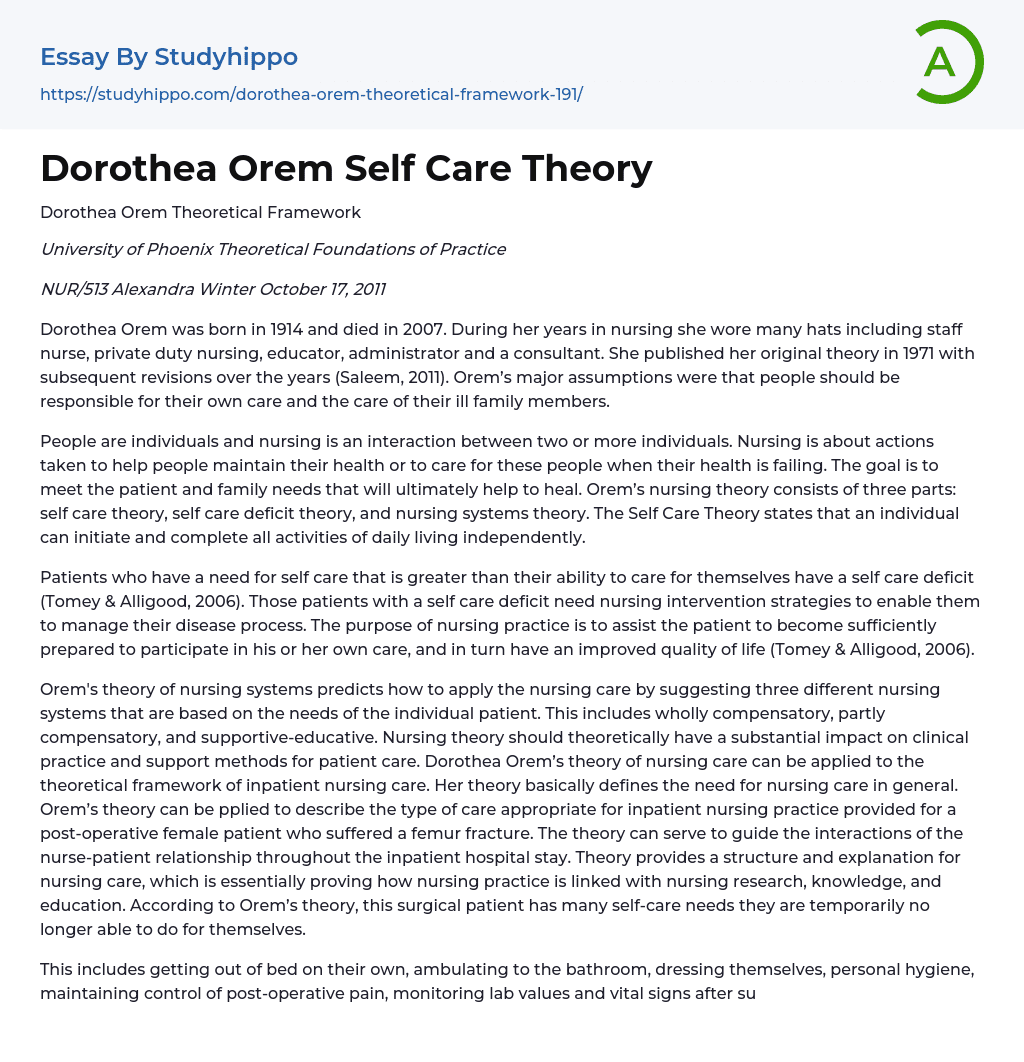Dorothea Orem was born in 1914 and died in 2007. During her years in nursing she wore many hats including staff nurse, private duty nursing, educator, administrator and a consultant. She published her original theory in 1971 with subsequent revisions over the years (Saleem, 2011). Orem’s major assumptions were that people should be responsible for their own care and the care of their ill family members.
People are individuals and nursing is an interaction between two or more individuals. Nursing is about actions taken to help people maintain their health or to care for these people when their health is failing. The goal is to meet the patient and family needs that will ultimately help to heal. Orem’s nursing theory consists of three parts: self care theory, self care deficit theory, and nursing systems theory. The Self Care Theory states that an individual
...can initiate and complete all activities of daily living independently.
Patients who have a need for self care that is greater than their ability to care for themselves have a self care deficit (Tomey & Alligood, 2006). Those patients with a self care deficit need nursing intervention strategies to enable them to manage their disease process. The purpose of nursing practice is to assist the patient to become sufficiently prepared to participate in his or her own care, and in turn have an improved quality of life (Tomey & Alligood, 2006).
Orem's theory of nursing systems predicts how to apply the nursing care by suggesting three different nursing systems that are based on the needs of the individual patient. This includes wholly compensatory, partly compensatory, and supportive-educative. Nursing theory should theoretically have a substantial impact
on clinical practice and support methods for patient care. Dorothea Orem’s theory of nursing care can be applied to the theoretical framework of inpatient nursing care. Her theory basically defines the need for nursing care in general. Orem’s theory can be pplied to describe the type of care appropriate for inpatient nursing practice provided for a post-operative female patient who suffered a femur fracture.
The theory can serve to guide the interactions of the nurse-patient relationship throughout the inpatient hospital stay. Theory provides a structure and explanation for nursing care, which is essentially proving how nursing practice is linked with nursing research, knowledge, and education. According to Orem’s theory, this surgical patient has many self-care needs they are temporarily no longer able to do for themselves.
This includes getting out of bed on their own, ambulating to the bathroom, dressing themselves, personal hygiene, maintaining control of post-operative pain, monitoring lab values and vital signs after surgery, and coordinating care with physical therapy to get the patient walking as soon as possible. In following Orem’s theory, the nurse wants to get this patient through the three different nursing systems as soon as possible. When the patient is fresh out of the OR he is in the wholly compensatory stage where the patient has no active role in care.
By the time the patient is sent to the floor he is the partial compensatory stage where both the nurse and patient take active roles in his recovery. In the educative development stage the patient is mostly self-care but just uses the nurse for minimal assistance and is mostly likey to be discharged from the hospital soon.
References
- Saleem, T. (Ed.
). (2011, October 2).
- Hospital essays
- Physician essays
- Health Care Provider essays
- Universal Health Care essays
- Readmission essays
- Psychometrics essays
- Measure essays
- Why I Want to Be a Nurse essays
- Nursing Profession essays
- Why Did You Choose Nursing essays
- Addiction essays
- Anatomy and Physiology essays
- Biodegradation essays
- Cancer essays
- Dental Care essays
- Disability essays
- Disease essays
- Disorders essays
- Health Care essays
- Infectious Disease essays
- Inquiry essays
- Intelligence Quotient essays
- Lung Cancer essays
- Medicine essays
- Neurology essays
- Nutrition essays
- Olfaction essays
- Physical Exercise essays
- Public Health essays
- Sex essays
- Women's Health essays
- World health organization essays
- Adaptation essays
- Adventure essays
- Adversity essays
- Aging essays
- Alcohol essays
- Barbie Doll essays
- Beauty essays
- Care essays
- Carpe diem essays
- Change essays
- Chess essays
- Chicken essays
- Choices essays
- Contrast essays
- Crops essays
- Development essays
- Dream essays
- Evil essays




